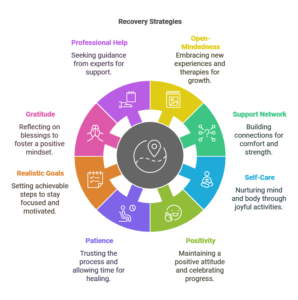
What to Bring to Rehab: A Comprehensive Checklist
Introduction:
Preparing for an in-facility rehab program can be a daunting task, especially when it comes to packing. This “What to Bring To Rehab” checklist is designed to help you gather everything you need for a comfortable and successful stay.
From essential items to personal comforts, this list covers it all. We’ve included a unisex section, followed by specific recommendations for men and women, and concluded with some words of wisdom to support you on your journey.
Unisex Items:
- Identification and Documents:
- Government-issued ID (driver’s license, passport)
- Insurance card
- Emergency contact information
- List of current medications and dosages
- Medical records (if required)
- Clothing:
- Comfortable, casual clothing (enough for 7-10 days)
- Sleepwear (pajamas, nightgowns)
- Undergarments and socks
- Sweaters or hoodies for layering
- Comfortable shoes (sneakers, slippers)
- Flip-flops for the shower
- Workout clothes (if exercise is part of the program)
- Toiletries:
- Toothbrush and toothpaste
- Shampoo and conditioner
- Body wash or soap
- Deodorant
- Hairbrush or comb
- Razor and shaving cream
- Feminine hygiene products (if applicable)
- Skincare products (moisturizer, sunscreen)
- Personal Items:
- Prescription medications (in original bottles)
- Glasses or contact lenses (with solution and case)
- Journal or notebook
- Books or magazines
- Photos of loved ones
- Small amount of cash for vending machines or personal expenses
- Miscellaneous:
- Reusable water bottle
- Alarm clock (without radio)
- Earplugs or sleep mask (if sensitive to light/noise)
- Laundry bag
What Men Should Bring:
- Clothing:
- Extra pairs of boxers or briefs
- T-shirts and tank tops
- Jeans or casual pants
- Dress shirt and pants (if required for any formal meetings)
- Toiletries:
- Beard trimmer or electric shaver (if applicable)
- Aftershave or cologne (if allowed)
- Personal Items:
- Sports equipment (if allowed and part of the program)
What Women Should Bring:
- Clothing:
- Extra bras and panties
- Dresses or skirts (if preferred)
- Leggings or yoga pants
- Comfortable tops and blouses
- Toiletries:
- Makeup (if allowed)
- Hair styling tools (hairdryer, straightener, curling iron)
- Personal Items:
- Jewelry (minimal and non-valuable)
- Craft supplies (knitting, crochet, etc., if allowed)
Words of Wisdom:
Entering rehab is a courageous step towards a healthier and happier life. Remember that this journey is about you and your recovery. Here are a few words of wisdom to keep in mind:
- Stay Open-Minded: Embrace the process and be open to new experiences and therapies.
- Build a Support Network: Connect with fellow patients and staff. Support from others can be incredibly powerful.
- Focus on Self-Care: Take time to rest, reflect, and nurture your mind and body.
- Stay Positive: Recovery is a journey with ups and downs. Keep a positive attitude and celebrate your progress, no matter how small.
- Be Patient: Healing takes time. Be patient with yourself and trust the process.
- Set Realistic Goals: Break down your recovery journey into manageable steps. Setting realistic and achievable goals can help you stay focused and motivated. Celebrate each milestone, no matter how small, as it brings you closer to your ultimate goal.
- Practice Gratitude: Take time each day to reflect on the things you are grateful for. Practicing gratitude can shift your focus from what you lack to what you have, fostering a positive mindset and improving your overall outlook on life.
- Seek Professional Help: Don’t hesitate to reach out to counselors, therapists, or medical professionals for support. They can provide valuable guidance and resources to help you navigate your recovery journey.
- Stay Committed: Recovery is a lifelong commitment. Stay dedicated to your goals and remind yourself of the reasons you chose this path. Your commitment to recovery is a testament to your strength and resilience.
- Embrace Change: Recovery often involves significant changes in your lifestyle, habits, and relationships. Embrace these changes as opportunities for growth and self-improvement. Change can be challenging, but it is also a vital part of the recovery process.

Wishing you strength and success on your path to recovery. You’ve got this! Remember, every step you take is a step towards a brighter future. Stay strong, stay positive, and believe in yourself. You are capable of achieving great things.
Here is an excellent external source for additional information: Drug rehabilitation – Wikipedia